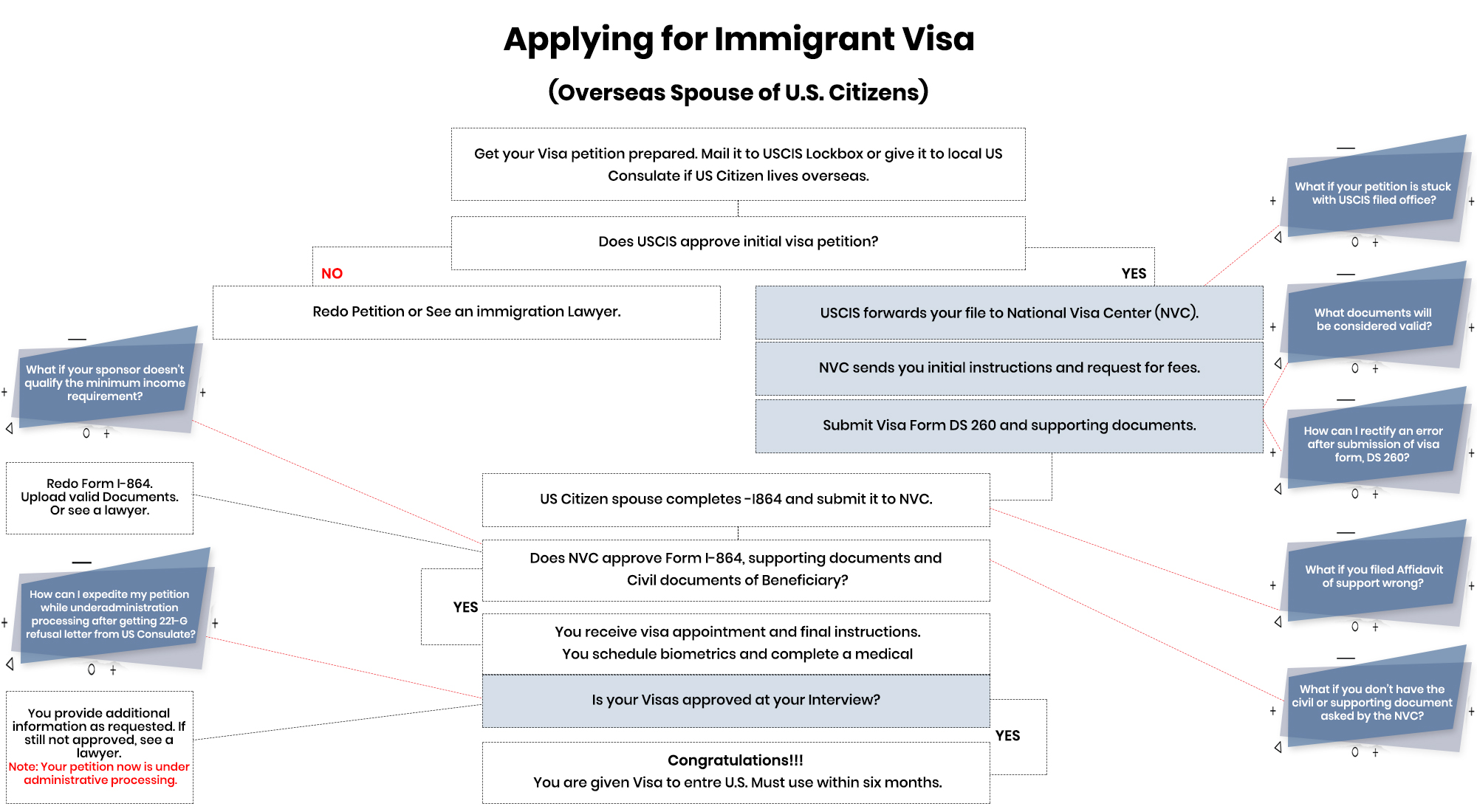FAQ Family-Based Immigration
FREQUENTLY ASKED KNOWLEDGE BASED QUESTIONS
What types of visas are available if I want to come to the U.S. for a visit or a temporary stay?
If you wish to temporarily visit the United States or be granted entry for a particular period, you need a non-immigrant visa. Some of the most common non-immigrant visas are student visas, business investor visas (if you are planning on coming to the U.S. to invest in a business), or a travel visa (if you wish to do some travelling in the U.S.)
What type of visa should I get if I want to become a permanent U.S. resident?
Depending on your current immigration status or situation, there are a number of visas available to foreign nationals wishing to permanently immigrate to the United States. There is a fiancé(e) visa (if you are a foreign national engaged to a U.S. citizen), family visas (if you have or are the relative of a U.S. citizen and wish to immigrate to the U.S.), a work visa (if you have unique skills or requirements which make you a hot commodity in a particular field or industry), and more.
How long will my Green Card remain valid?
Permanent residency, obtained through a Green Card, allows a foreign national to live and work in the United States on a potentially indefinite basis. A Conditional Green card is valid for two years. After the first two years, provided you have not been convicted of any criminal activity. In addition, you have maintained your eligibility status. Then, you can apply for a permanent residence visa valid for ten years.
My visa has expired. What can I do?
If your visa has expired, the first thing you need to do is contact an immigration attorney from our firm. We can sit down with you, review your current status and situation, and then help you determine the best course of action to pursue. Time is of the essence for expired visas, so we advise you not to delay
I am in the United States on a temporary visit and wish to obtain a permanent visa. What can I do?
Changing immigration status in the United States can be difficult, and there is no guarantee if it can be approved. If possible, what you will be required to do, will vary from person to person. That is why such type of question can be answered after consulting an experienced immigration attorney. Our attorneys can take the time to review your status and case, analyze the situation at hand, and help you map out the course of action best geared to accomplish your immigration objectives.
I have received a deportation order. Is there anything I can do to avoid being deported?
You can apply to the court that issued the order of deportation, for the court to cancel the order of deportation, or apply with the Immigration Service to waive or cancel your former order of deportation. It would be best if you had a good moral character. If you are being deported, you must show "exceptional and extremely unusual" hardship to your U.S. citizen or lawful permanent resident spouse, parent or child.
How long does it take to get a family-based immigrant visa approved?
It depends on the category in which you are applying. In the Immediate Relative (IR) category, an unlimited number of visas are available. That means that processing can begin immediately upon approval of the initial petition. However, from start to finish, IR visas typically take from six to nine months or longer, depending on the circumstances. There are annual numerical limits in the Family Preference category, and applicants may have to wait several years for a visa to become available.
Who is eligible to sponsor a family-based visa petition?
Sponsors must be U.S. citizens or lawful permanent residents (LPRs) at least 21 years of age. Sponsors must also have a domicile in the United States or a U.S. territory. If a sponsor lives abroad, they must prove that their residence abroad is temporary and their permanent habitation is in the U.S.
Sponsors must prove their family relationship with the applicant/beneficiary and meet specific financial requirements.
IF I AM A U.S. CITIZEN, WHAT RELATIVES CAN I SPONSOR TO BECOME PERMANENT RESIDENTS?
U.S. citizens may petition for the following relatives to obtain green cards through the Immediate Relative (unlimited visa) category:
Spouses
Unmarried Children under Age 2;
Parents if the U.S. citizen is at least 21 years of age
U.S. citizens may petition for the following relatives to obtain green cards through the
Family Preference (limited visa) category:
Who Is Eligible To Sponser a Family-Based Visa Petition?
Sponsors must be U.S. citizens or lawful permanent residents (LPRs) who are at least 21 years of age. Sponsors must also have a domicile in the United States or a U.S. territory. If a sponsor lives abroad, they must show proof that their residence abroad is temporary, and their permanent domicile is in the U.S. Sponsors must prove their family relationship with the applicant/beneficiary and meet certain financial requirements as well.
If i am a U.S. Citizen, what relatives can i sponsor to become permanent residents?
U.S. citizens may petition for the following relatives to obtain green cards through the Immediate Relative (unlimited visa) category:
I am a U.S. Citizen. Can i bring my aunt, uncle, and cousins here as permanent residents?
No. There is no family-based visa category for aunts, uncles, cousins, or grandparents.
I am marrying a foreign national who lives in another country. Is it better to bring her here to get married on a fiancé visa or have the wedding abroad and petition her on a spouse visa?
K visas provide two potential paths for U.S. citizens getting married to a foreign national. The K1 visa is for fiancés or fiancées, and the K3 visa is for spouses. You may also file petitions for their minor children (K2 and K4 visas). The fiancé and spouse visa processes are similar and take about the same amount of time. However, each has its advantages and disadvantages, and the right option is dependent on your specific circumstances. Contact our office to learn more about which type of K visa is right for you.
I married a U.S. Citizen while in the United States on a temporary visa. What do i need to do next to obtain a green card?
Suppose you were here lawfully on a temporary (non-immigrant) visa and married a U.S. citizen. In that case, you may apply for an adjustment of status to become a permanent resident and receive a conditional green card.
I received a notice to appear (NTA) for a removal hearing. So how do i fight it?
Non-U.S. citizens may be subject to deportation/removal proceedings if the Department of Homeland Security (DHS) believes they violate immigration or specific criminal laws. Receiving a notice does not make you guilty, however. Various deportation defenses could be used successfully, depending on the situation. The first step is to speak with an experienced immigration attorney to assess your case and go over your options thoroughly.
I was denied a visa. Is it possible to get a visa waiver?
Immigrants who were denied a visa may be eligible for a waiver of inadmissibility. Waivers may be granted for specific health conditions, prior deportations/removals, minor crimes, and if you can, demonstrate that refusing a release would cause extreme hardship. Waivers are also available for those who qualify under a specific law or executive action, such as the Legal Immigration Family Equity (LIFE) Act, Nicaraguan Adjustment and Central American Relief Act (NACARA), Deferred Action for Childhood Arrivals (DACA), and the Violence against Women Act (VAWA).
What is the difference between citizenship and naturalization?
There are two general types of U.S. citizens: citizens by birth and naturalized citizens. Those born in the United States or born to U.S. citizens abroad receive automatic citizenship. All others obtain citizenship through what is known as the naturalization process. In general, lawful permanent residents (LPRs) can apply for naturalization if they have maintained continuous residence in the U.S. for three or five years, depending on the circumstances

